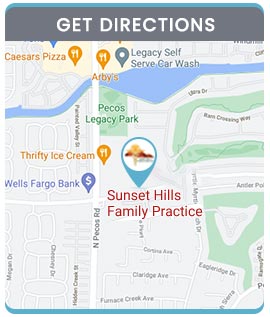Diabetes Management Specialist Q&A
Living with diabetes can be challenging, but it doesn’t have to limit your life. At Sunset Hills Family Practice, our dedicated specialist, Andrea Warburton MSPHS, PA-C, is here to support you every step of the way. We offer comprehensive care tailored to your specific needs, including medication management, and regular monitoring. Our goal is to empower you to live a fulfilling life with diabetes. For more information, contact us today or schedule an appointment online. We are conveniently located at 2510 Wigwam Parkway, Suite 102, Henderson, NV 89074.


Table of Content:
What is the best treatment for diabetes?
What are the five stages of diabetes?
Can diabetes go away?
What are the early warning signs of diabetes?
How would you know if you have diabetes?
How do you get diabetes?
How do you manage diabetes?
Diabetes is a common condition that affects millions of Americans.
Luckily, treatment is available, and people can live long, happy lives while managing their diabetes.
Lowering the body’s blood sugar is a key component of diabetes treatment, whether through the use of insulin in the case of type 1 diabetes or through oral medication in the case of type 2 diabetes.
Insulin may also be required for people with type 2 diabetes, depending on their unique situation.
A healthy, nutritious diet, as well as regular physical activity, are also key components to the treatment of diabetes.
There are 2 common types of diabetes – easily identified as type 1 and type 2.
Both types have 5 different stages that the body can go through as it progresses through the condition.
In type 1, the stages are:
• Pre-Stage 1 involves a genetic analysis to determine the patient’s risk for developing the disease based on underlying genotypes found in the body.
• Stage 1 has blood sugar levels in the normal range and no symptoms, but at least one autoantibody related to diabetes has been found in the blood.
• Stage 2 still doesn’t experience any symptoms although now there are at least two autoantibodies found in the blood that are related to diabetes.
• Stage 3 exhibits symptoms such as excessive hunger or thirst, severe fatigue, unexplained weight loss, frequent urination, and blurry vision. Autoimmunity has also caused a significant loss to the beta cells.
The stages of type 2 diabetes are:
• Stage 1 has blood sugar levels still in the normal range; however, fat, muscle, and liver cells have become insulin resistant.
• Stage 2, or prediabetes, sees an increase in blood glucose levels higher than normal, and blood sugar levels not being able to be lowered back to normal.
• Stage 3 has blood sugar levels abnormally high with high blood sugar levels.
• Stage 4 experiences high blood sugar and vascular complications that can lead to stroke, heart failure, coronary artery disease, and chronic kidney disease, among other conditions.
For both type 1 and type 2 diabetes, the fifth and final stage is referred to as “end-stage diabetes.” This term doesn’t get used extensively as it references advanced complications, such as end-stage renal disease, basically at the end of the patient’s life.
Diabetes does not have a cure and patients with diabetes will need to learn how to manage it on a day-to-day basis.
Your first step is confirming a diabetes diagnosis with your primary care physician and then building a treatment plan based on your diagnosis and treatment needs.
Additional health care professionals may be consulted or brought in as part of your care team, including an endocrinologist, dietician, certified diabetes care and education specialist, and any other specialized doctors who would help to manage potential complications in their realm of specialization.
In many cases of type 2 diabetes, there are no symptoms until a person experiences complications relating to the condition.
This means people can potentially live several years with diabetes and not even be aware or suspect that they have the disease.
Type 1 diabetes symptoms can include excessive urination, thirst, weight loss, vision changes, constant hunger, and fatigue.
Those who suffer from type 2 diabetes may experience similar symptoms, but to a far lesser degree if there are no complications.
Diabetes testing is done through a quick and easy blood test that measures blood sugar levels.
This testing may be done automatically as part of routine bloodwork that your primary care physician may recommend for you every few years, or it may be requested based on any symptoms you are exhibiting and can’t explain.
At Sunset Hills Family Practice, your health is our top priority, and we work with our patients if they suspect they may be at a high risk of diabetes or are experiencing symptoms.
Diabetes is a disease that is caused by the body’s inability to create enough insulin or its inability to effectively use the insulin that is produced by the pancreas.
The body’s blood sugar is levels are regulated by insulin, which is a hormone.
The exact root cause of diabetes is not currently known although environmental factors and genetics seem to play a role.
You and your doctor can discuss your family medical history, current diet, and activity levels, and your overall health and lifestyle to determine if you may be at an increased risk of developing the disease.
The management of a patient’s diabetes is going to be unique to them, depending on what type of diabetes they have and what stage they are in.
The team at Sunset Hills Family Practice can build out a treatment plan for you upon confirmation of a diabetes diagnosis that will factor in your diet and physical activity level as well as any medication you may need and insulin injections, if necessary. We serve patients from Henderson NV, Paradise Hills NV, Midway NV, Gibson Springs NV, and Winchester NV.




